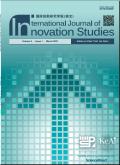Achieving social innovation in the digital age: A case study of microbusiness
IF 5.3
Q2 MANAGEMENT
引用次数: 0
Abstract
This study explores the feasibility of micro-enterprise cluster applications in online-to-offline service platforms to better understand the impact of social innovations and information and communications technology (ICT) capabilities in the digital age. We tried to discover the factors that affect micro-enterprises’ social innovations and sustainable development outcomes. The qualitative data analysis method is summarized using exploratory data analysis. This study reveals that the key drivers of social innovation for microbusiness clusters are shared value proposition and actor engagement, as per the multiple cases through interviews and observations. This study emphasizes that online-to-offline (O2O) e-commerce is an important part of service platforms, especially in the application of microbusiness clustering social innovation, because social innovation can impact their sustainable development by enhancing their ICT ability, which can also increase the application level of service platforms. The sustainable development of microbusiness is one type of sustainable transformation. There are four types of social innovations in microbusiness clusters: the Branding model, the customer interaction mode, the collaboration and profit sharing mode, and the sustainable development mode. The driving forces of the social innovations of microbusiness are frugal-driven, socially driven, and sustainability-driven forces.
在数字时代实现社会创新:以微型企业为例
本研究探讨微型企业集群应用于线上到线下服务平台的可行性,以更好地了解数字时代社会创新和信息通信技术(ICT)能力的影响。我们试图发现影响微企业社会创新和可持续发展成果的因素。采用探索性数据分析对定性数据分析方法进行总结。本研究通过访谈和观察发现,微商集群社会创新的关键驱动因素是共享价值主张和行动者参与。本研究强调线上到线下(O2O)电子商务是服务平台的重要组成部分,尤其是在微商集群社会创新的应用中,因为社会创新可以通过增强微商集群的ICT能力来影响其可持续发展,同时也可以提高服务平台的应用水平。微商可持续发展是一种可持续转型。微商集群的社会创新有四种类型:品牌模式、顾客互动模式、协作与利润分享模式和可持续发展模式。微商社会创新的驱动力是节俭驱动、社会驱动和可持续驱动。
本文章由计算机程序翻译,如有差异,请以英文原文为准。
求助全文
约1分钟内获得全文
求助全文
来源期刊

International Journal of Innovation Studies
Business, Management and Accounting-Strategy and Management
CiteScore
8.10
自引率
0.00%
发文量
23
审稿时长
19 weeks
 求助内容:
求助内容: 应助结果提醒方式:
应助结果提醒方式:


